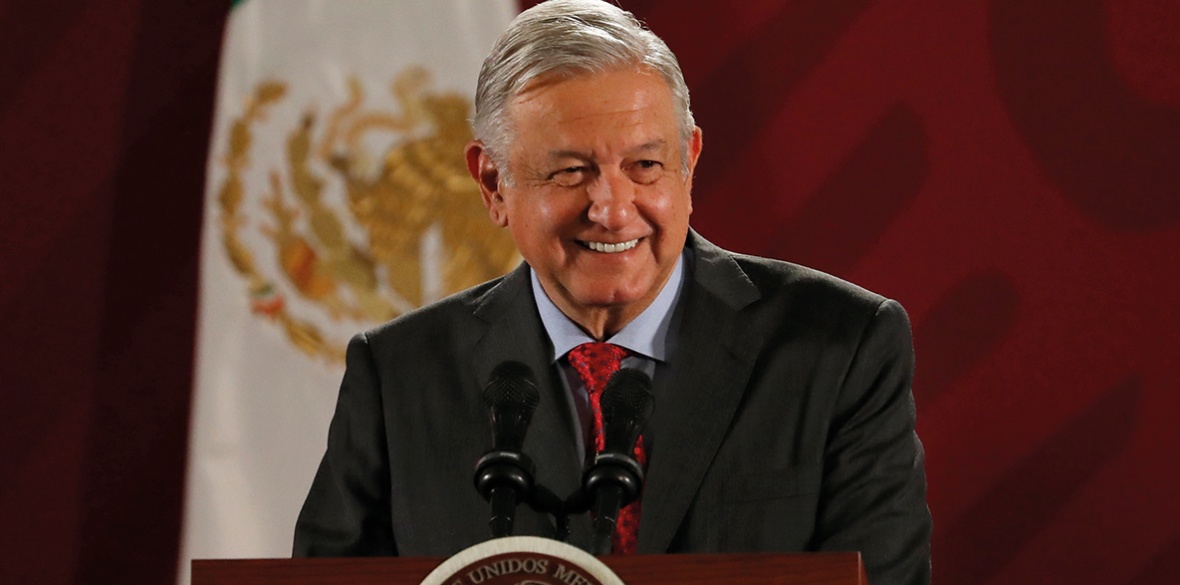This is the last article you can read this month
You can read more article this month
You can read more articles this month
Sorry your limit is up for this month
Reset on:
Please help support the Morning Star by subscribing here
ARGENTINE President Alberto Fernandez made a high-profile official two-day visit to Mexico on February 22, where he was invited by Mexican President Amlo (Andres Manuel Lopez Obrador) to address the Mexican Congress and participate in one of Amlo’s well-known morning press conferences.
In addition to meetings with business groups and visiting a pharmaceutical plant which works with Argentina to process the Astra-Zeneca vaccine for Latin America, Fernandez attended two very symbolic commemorative events to mark the 200th anniversary of Mexican independence from Spain.
Both presidents made bold statements reaffirming Latin American unity and anti-imperialist struggle and Amlo chose the occasion to revive the memory of Vicente Guerrero, an Afro-Indigenous insurgent leader hitherto neglected in the country’s historiography.
On February 24 the two presidents signed a major joint declaration reaffirming the Strategic Association of the two countries and a series of specific commitments including defence of sovereignty and self-determination, support for democracy in Bolivia and Ecuador — and Mexican recognition of Argentina’s claim to the Malvinas (Falkland) Islands and neighbouring territories.
In the context of continued illegal US sanctions against socialist Cuba, Venezuela and Nicaragua and hard-right use of “lawfare” and media distortion to exclude the left from elections, the importance of this declaration from the progressive presidents of two of Latin America’s largest countries can scarcely be exaggerated.
Amlo and Fernandez pointedly warned the OAS (Organisation of American States, a regional body manipulated by the US) that its electoral observation missions “should stick strictly to objective technical criteria” and “avoid what occurred in Bolivia in 2019” when the OAS shamelessly helped promote false accusations of fraud against Evo Morales and facilitated a right-wing coup.
Morales took refuge in Mexico (Amlo’s government saved his life) and then in Argentina, until massive popular resistance restored Bolivian democracy in October 2020.
The joint declaration also specifically warns the OAS not to interfere in Ecuador where progressive candidate Andres Arauz heads the polls after February’s first-round election and is favourite to win the runoff on April 11, but right-wing interests have resorted to all kinds of dirty tricks to try to sabotage his campaign.
Mexico and Argentina also reaffirm their joint efforts to address the Covid-19 pandemic, in which they have taken the lead in ensuring access to vaccines not just for their own countries but for all of Latin American and the world.
It was Mexico which promoted the UN resolution last year which led to the Covax initiative, intended to provide universal access to vaccines and medical treatments for all countries and both nations here repeat their commitment to raising the issue again at the UN and opposing the monopolisation of vaccines by a few rich nations.
The two also emphasise their stand in the G20 group of countries to push for a socio-economic recovery plan based on “solidarity, social inclusion and sustainable development.”
Latin American and Caribbean integration, based on independence and respectful but sovereign relations with Washington, is fundamental to the Mexican-Argentine vision.
They are promoting such institutions as Celac (the Community of Latin American and Caribbean States) which was created 10 years ago as a Venezuelan initiative, encompassing all Western Hemisphere countries except the US and Canada.
Over the past several years of neoliberal and right-wing offensives, Celac had not disappeared but it was increasingly being marginalised by the US-backed revival of the OAS as the dominant regional organisation; Celac’s revival is therefore very significant.
Bilateral arrangements between the two countries were also reinforced, in agriculture, industry, education, culture and research. Their ambition is shown by the decision to launch a joint communications satellite and to create a Latin America and Caribbean Space Agency.
None of this has been reported by the mainstream media in the West, but its impact will soon be impossible to ignore.
Such a clear and principled stand by these two great countries at the far North and far South of Latin America, combined with skilful diplomacy, has revived hope for progressive change throughout the region.
David Raby is a retired academic and independent researcher on Latin America. He can be reached at [email protected] and on Twitter @DLRaby.











